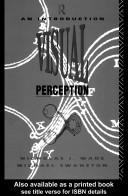| Listing 1 - 1 of 1 |
Sort by
|

ISBN: 0203133250 9780203133255 041501042X 0415010438 9780415010429 9780415010436 1280328118 Year: 1991 Publisher: [Place of publication not identified] Routledge
Abstract | Keywords | Export | Availability | Bookmark
 Loading...
Loading...Choose an application
- Reference Manager
- EndNote
- RefWorks (Direct export to RefWorks)
Vision is our most dominant sense, from which we derive most of our information about the world. From the light that enters the eye and the processing in the brain that follows, we can sense where things are, how they move and what they are. The first edition of Visual Perception took a refreshingly different approach, to perception, starting from the function that vision serves for an active observer in a three-dimensional environment. In this second edition Nicholas Wade and Michael Swanston have continued this approach in contrast to many traditional textbook treatments of vision as a catalogue of phenomena. The core of the book covers the perception of location, motion and object recognition. The machinery of vision is also described. The book places the study of vision in its historical context as our ideas have been shaped by art, optics, biology and philosophy as well as psychology. The authors have again provided a readable, accessible and truly relevant introduction to the world of perception that will be welcomed by students studying visual perception and those with a general interest.
Visual perception --- Visual discrimination --- Motion perception (Vision) --- Vision --- Discrimination, Psychological. --- Visual Perception. --- Visual Processing --- Perception, Visual --- Processing, Visual --- Vision, Ocular --- Discrimination, Psychology --- Psychological Discrimination --- Eyesight --- Seeing --- Sight --- Senses and sensation --- Blindfolds --- Eye --- Physiological optics --- Movement perception (Vision) --- Speed perception --- Movement, Psychology of --- Sensory discrimination --- Optics, Psychological --- Perception --- History --- Psychological aspects
| Listing 1 - 1 of 1 |
Sort by
|

 Search
Search Feedback
Feedback About UniCat
About UniCat  Help
Help News
News